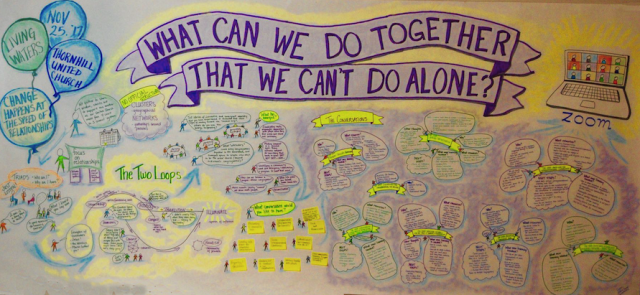Letting go of how we have done things makes space for what is longing to emerge among us.

With the remits likely moving us toward a three-council model in The United Church of Canada, Living Waters Presbytery (Toronto Conference) wanted to ensure that local communities of faith will receive the support of being connected to other faith communities that is currently provided through presbytery.
One aspect of the upcoming changes is the development of clusters and networks. According to the Executive of the General Council, clusters will “provide community and support for communities of faith and their leaders, and focus on worship, mission, learning, collegiality, and strategic planning,” while networks will “link people working on specific issues or for project work.” It will be up to local churches and other ministries to create these collaborations.
In fall 2017 Living Waters initiated the Clustering and Networking Project to help build capacity to collaborate more effectively by providing opportunities and developing skills for congregations and other ministries to create clusters and networks. Recognizing that we can accomplish more together than working on our own, we have been convening a series of gatherings at various churches to discuss and allow a direction for this work to emerge through dialogue.
A few insights became clear in the course of our gatherings:
- There is an appetite among some congregations to work more closely together.
- There are causes and concerns that people are ready to champion to create opportunities for further conversation.
- While there is a preference for face-to-face meetings, the future of the United Church will require the capability and willingness to communicate through new technology. We have been experimenting with video conferencing using both Zoom and RingCentral Meetings and have found them to be extremely useful to provide an engaging way for conversations online.
Follow-up gatherings and conversations are continuing through the spring. We are developing and supporting groups of people who are willing to take the next steps to connect in order to build relationships and to explore ways of working together. There is an openness and excitement as we embark upon this task.
In the fall of 2018 a number of opportunities are planned to strengthen connections between communities of faith and to develop skills for collaborating that we anticipate will be helpful in the development of these new relationships:
- Five days for developing skills and building relationships are planned throughout the fall to prepare the ground for emerging possibilities of developing clusters and networks. Topics to be explored include: 1) Developing Small Group Ministry or Circles with practices and principles that intentionally create a culture to ensure we are developing safe places for significant conversations within communities of faith, amongst communities of faith, and beyond to reach out to the people of our neighbourhoods; 2) Developing Community Partners; 3) Being Church in Times of Cultural Shift; and 4) Ministry in Times of Cultural Change as We Seek the Common Good.
- We are also offering a nine-month in-depth course on Faith Community Innovations to provide ongoing support as clusters and networks develop.
- Plans are in the making for a series of Getting to Know You Celebrations this fall for people within communities of faith to get to know people from other communities of faith. In presbytery the number of people who engage with each other is limited based on representation. In clusters and networks we are now inviting whole communities of faith to consider connecting. What is clear is that if there is going to be collaboration, the groundwork is established through time together to build relationships and trust. Clusters and networks are not going to be mandated, so they have to emerge at a grassroots level, which will happen through significant and intentional conversations.
In these times of transition we need to be adaptable. We need to be willing to let go of how we have done things to make space for what is longing to emerge among us. We need to follow the flow of Spirit’s inspiration to discover what might be possible.
A vision is growing amongst us of what we might do together in new ways to build on the foundation of the good work of the past. As this vision grows, may ministers encourage one another and encourage the people of our Communities of Faith to engage in opportunities for connection to enhance the ministry we share.
Adapted with permission from What Can We Do Together That We Can’t Do Alone? by Terry Davies, Chair of Living Waters Presbytery; with contributions from Karen Hilfman Millson, Minister for Vision and Mission at Living Waters; and Joe Ramsay and Associates Inc.